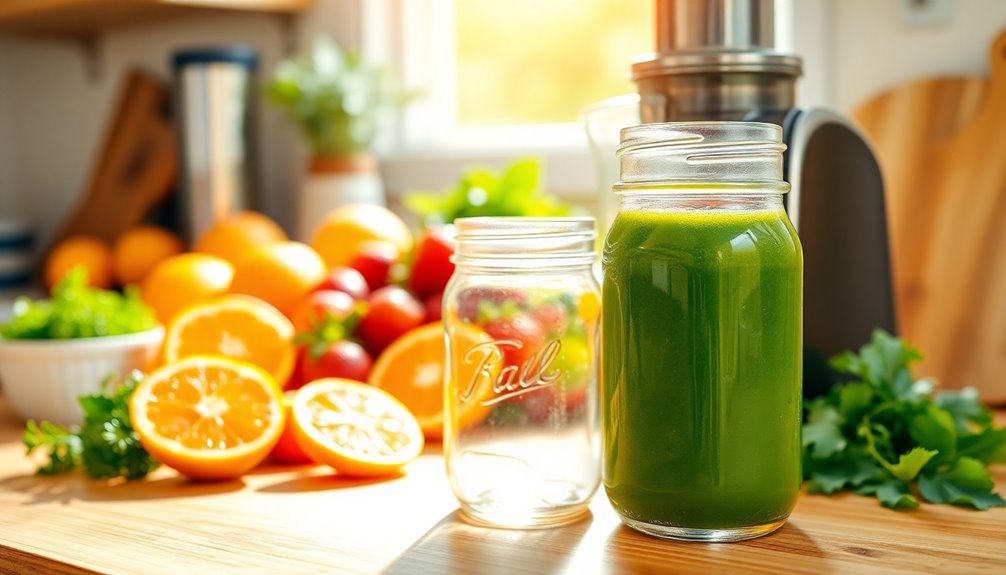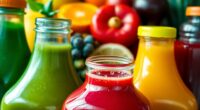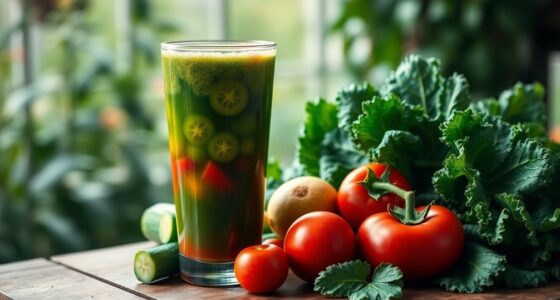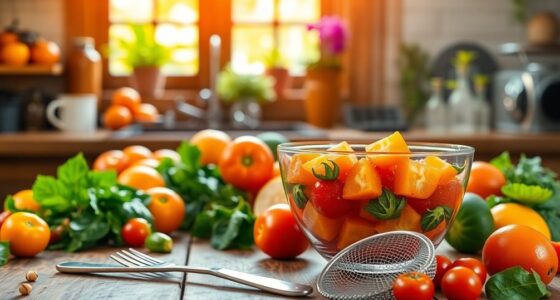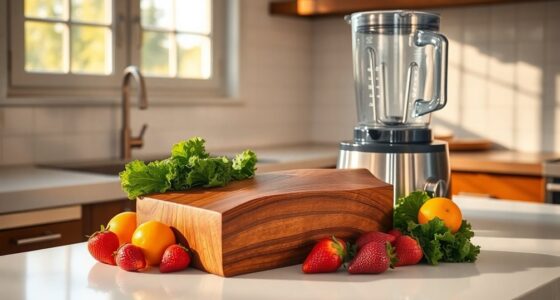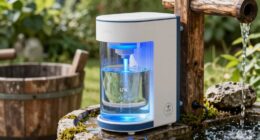Creating your own homemade organic juices is simple and rewarding! Start by choosing fresh, seasonal ingredients like citrus fruits, leafy greens, and sweet veggies. Use a masticating or cold-press juicer to retain nutrients, and mix flavors for a delightful taste. Experiment with recipes, like beet apple juice or a refreshing green juice. Store your creations in airtight containers to keep them fresh. Keep going to discover tips for customizing flavors and maximizing health benefits!
Key Takeaways
- Choose organic, seasonal fruits and vegetables to maximize flavor and nutrient content in your homemade juices.
- Invest in a quality juicer, such as a masticating or cold-press model, for optimal nutrient retention.
- Experiment with various ingredients, including leafy greens and herbs, to create unique flavor combinations.
- Store your freshly made juice in airtight glass containers to maintain freshness and prevent oxidation.
- Set a consistent juicing schedule to meet your health goals and enjoy the benefits of homemade organic juices.
Health Benefits of Homemade Juices
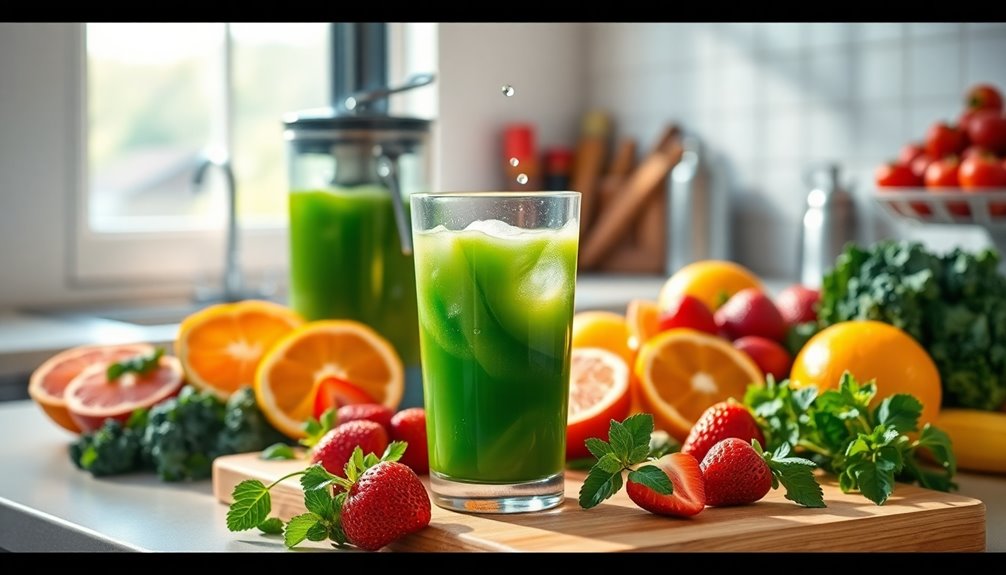
When you choose to make homemade juices, you're not just enjoying a refreshing drink; you're also reaping numerous health benefits.
Fresh juices are packed with nutrients, retaining more vitamins, minerals, and enzymes than their store-bought counterparts. This nutrient-rich content helps boost your immune system, thanks to the antioxidants and nutrients that combat illness. Additionally, homemade juices are known for their detoxification and cleansing properties, which aid in flushing out toxins and promoting overall wellness. Juices like green juices are particularly effective in detoxifying the body.
You'll also support detoxification, flushing out toxins and promoting overall wellness. Plus, you can customize your juice to meet specific health needs, enhancing digestive health with essential nutrients and active enzymes. Regularly sipping on homemade juices can improve energy levels, skin health, and even assist with weight management, making it a delicious way to nurture your body and promote long-term health.
Key Ingredients for Your Juice Creations
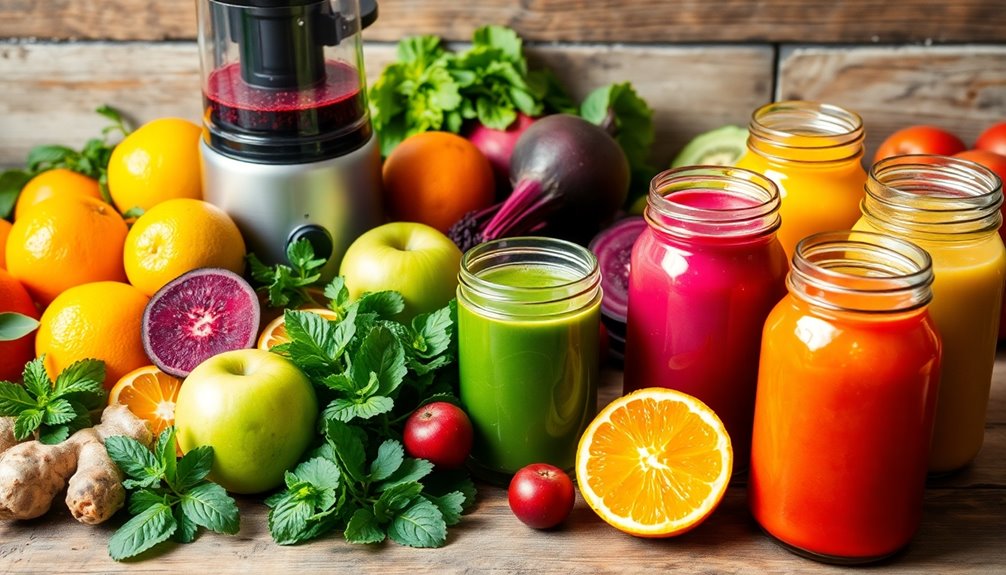
Creating delicious and nutritious juices starts with selecting the right ingredients. For fruit juices, incorporate citrus fruits like oranges and lemons for tang, and sweet fruits such as apples and pineapples for natural sweetness. Dark-colored berries will enhance flavor while tropical fruits like mangoes add an exotic touch. When it comes to green juices, leafy greens like spinach and kale are essential, while cucumbers and celery provide hydration. Sweet components, such as apples and carrots, can balance flavors. For vegetable juices, root vegetables like carrots and beets offer earthy tones, while cruciferous veggies support detoxification by promoting detoxification processes. Don't forget to spice things up with ginger, which enhances digestion and adds warmth to any juice creation. Additionally, sourcing organic ingredients can greatly improve the overall health benefits of your juice recipes.
Juicing Methods Explained
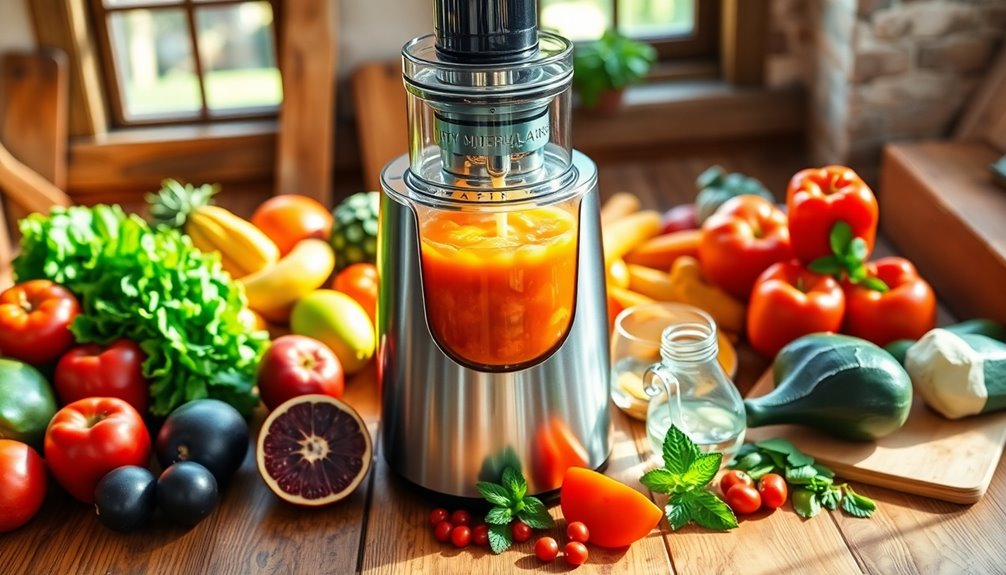
Juicing methods vary widely, each offering unique benefits and results. Cold press juicing stands out for its ability to preserve nutrients and antioxidants, making it a top choice for health enthusiasts. Additionally, steam juicing is commonly used for mass-produced bottled and canned juices, which can be a practical option for those looking to store juice for longer periods. Using fresh ingredients like organic fruits can further enhance the nutritional value of your juices.
If you're short on time, centrifugal juicers provide fast extraction but may lose some nutrients due to heat. For larger batches, steam juicing is efficient and great for canning. Manual juicing, using hand-operated devices like citrus presses, can be labor-intensive but cost-effective.
When choosing a juicer, consider masticating juicers for nutrient retention, or triturating juicers for versatility. Remember to address common challenges like oxidation and cleaning; maintaining your equipment is crucial for the best juice quality.
Explore these methods to find what works best for your juicing journey!
Popular Juice Recipes to Try
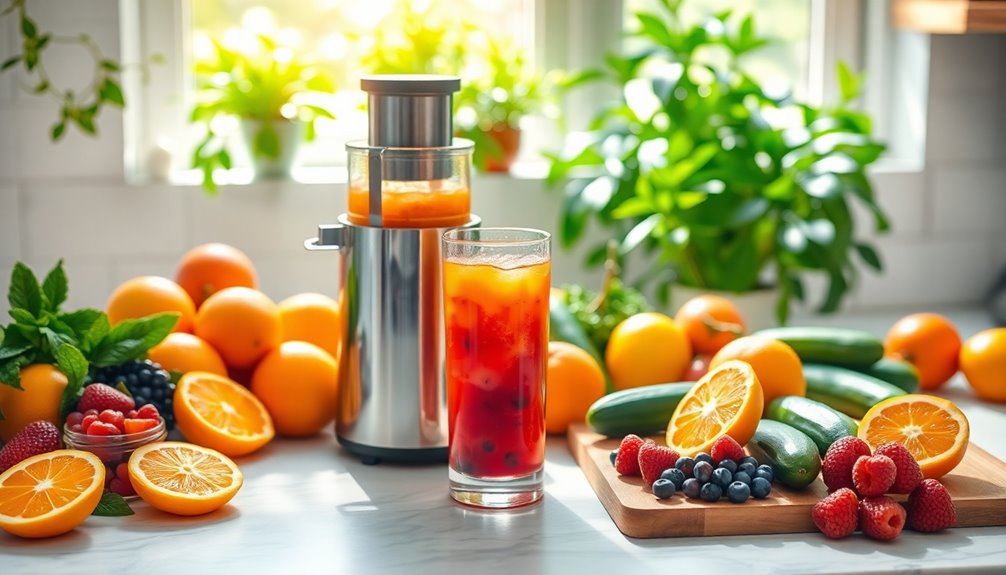
Exploring popular juice recipes can elevate your juicing experience and introduce you to a world of flavors and health benefits. Try the Beet Apple juice for a detox boost, combining beets, apples, and lemon. For antioxidants, mix white grapes, kiwi, strawberries, and lemon in a Berry Lemon juice. If you're looking for a refreshing summer drink, the Orange Citrus recipe blends navel oranges, cucumbers, turmeric, carrots, and ginger. Energize with a Simple Green Juice, featuring baby spinach, English cucumber, pineapple, ginger, and lemon. Additionally, you can explore 23 unique juice recipes to discover even more delicious combinations. For a creative twist, whip up a Strawberry Mojito with strawberries, watermelon, and mint. With these recipes, you can enjoy delicious, healthful juices tailored to your taste!
Nutritional Advantages of Juicing
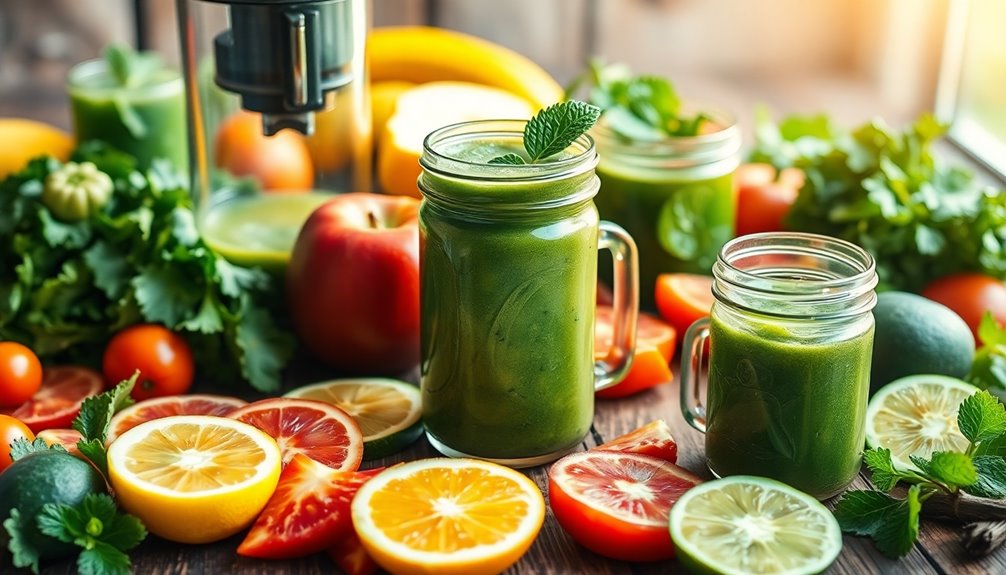
Juicing enhances your nutrient intake by allowing quick absorption without the fiber digestion hassle. You'll enjoy a vitamin and mineral boost, essential for your overall health. Additionally, juices high in antioxidants help fight inflammation and lower chronic disease risks. This method of extraction also mirrors the benefits of consuming fermented vegetables, which can significantly improve gut health.
The natural enzymes preserved in your juices aid digestion, while concentrated nutrients offer a powerful health punch. Juices high in Vitamin C support your immune system, and their low-calorie nature makes them great for weight management.
With all these benefits, you're not just sipping on something tasty—you're actively promoting your wellness!
Tips for Making Delicious Juices
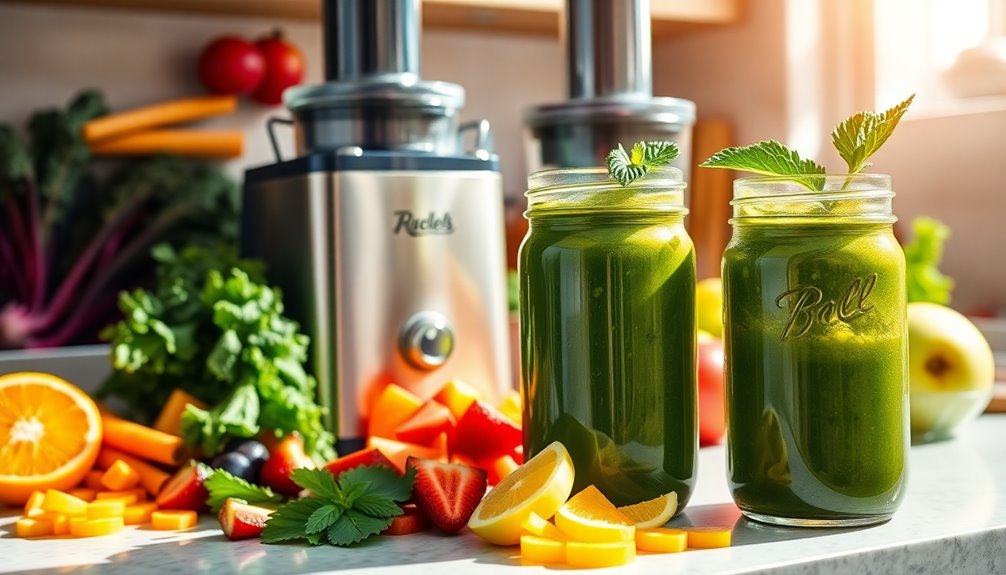
When you're ready to create delicious juices, selecting the right ingredients is crucial for flavor and health benefits.
Start by blending a variety of fruits—citrus, sweet, and dark-colored ones work well together. Make sure your fruits are ripe for optimal taste and nutrition, and consider using seasonal produce for freshness and savings. Including homemade fruit juice allows you to control sugar content and avoid harmful additives. Additionally, incorporating chia seeds into your juice can enhance its fiber content, promoting satiety and aiding in weight management.
Don't forget to clean your fruits and veggies thoroughly to remove any dirt. Peel fruits like citrus and kiwis to avoid bitterness, and chop them into smaller pieces for easier juicing.
If you want a higher yield, include ingredients like cucumbers or celery. Experiment with herbs like mint or basil to elevate the flavor of your juice, and enjoy the refreshing results!
Customizing Your Juice for Maximum Flavor
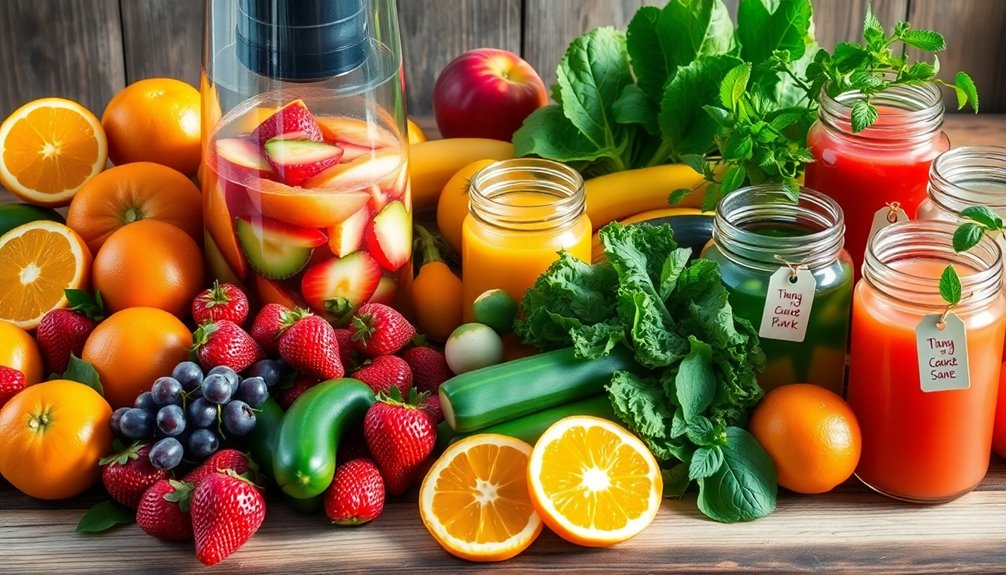
To create juices that tantalize your taste buds, you'll want to focus on balancing flavors and textures. Combine sweet ingredients like apples and pineapples with tart elements such as lemons and limes for depth. Earthy components like beets and carrots add richness, while cucumbers and celery increase volume. Don't forget a spicy kick from ginger! Additionally, experimenting with different components of green juices can lead to exciting new flavors and combinations.
Choose seasonal fruits and vegetables for freshness and consider their nutritional benefits. Using educational toys as a way to engage with children about healthy eating can make the process even more enjoyable. Use herbs like basil or mint for unique flavors. Adjust texture by adding ice for thickness or straining with a fine-mesh sieve. Leave skins on organic produce for nutrients, and experiment with colorful ingredients to enhance visual appeal. With practice, you'll discover your perfect juice blend!
The Environmental Impact of Homemade Juices
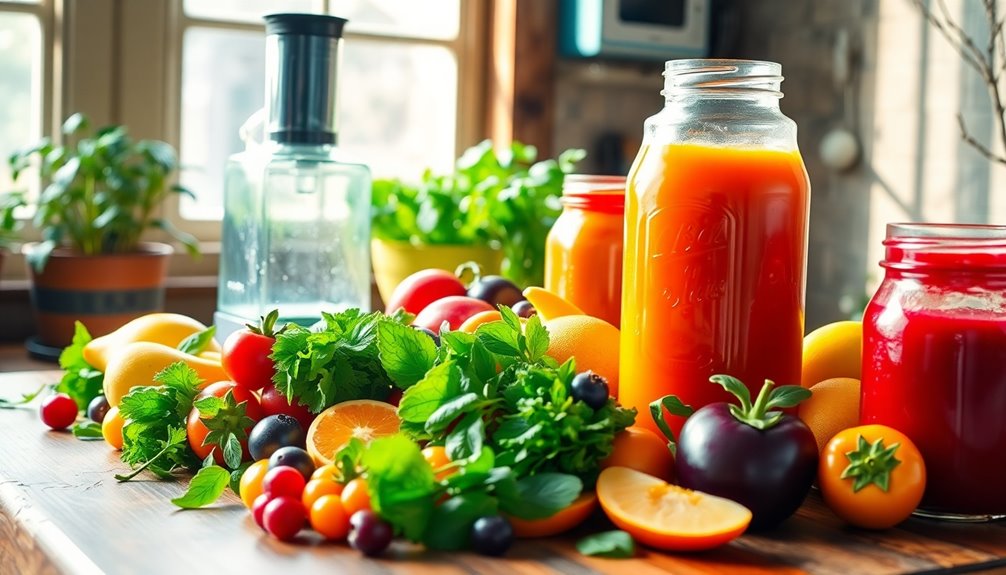
Homemade juices not only delight your palate but also contribute significantly to environmental sustainability. By eliminating single-use packaging, you reduce plastic waste and lower your carbon footprint by sourcing ingredients locally. You avoid preservatives and additives that harm the environment while supporting local farmers and sustainable agriculture. Additionally, making your juices typically requires less energy than industrial methods, further minimizing environmental impact. Furthermore, the trend of decentralized finance is reshaping traditional practices, which can inspire sustainable choices in other areas, including food production.
When you juice at home, you can compost the pulp, turning waste into nutrient-rich soil, or repurpose it in smoothies and soups. This practice reduces landfill contributions and encourages efficient use of resources. Furthermore, by choosing organic ingredients, you are ensuring that your homemade juices are free from harmful chemicals that can damage ecosystems.
Embracing homemade juices fosters eco-friendly habits and supports organic farming, making a positive difference for our planet. Enjoy your tasty, guilt-free creations!
Storing and Preserving Your Juices
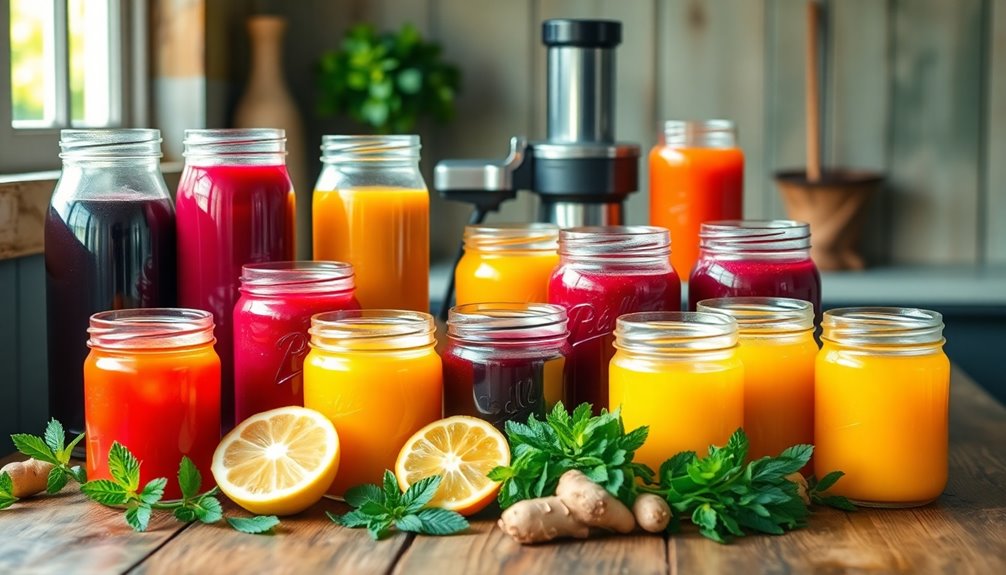
Properly storing and preserving your juices is essential for maintaining their freshness and nutritional benefits.
Use airtight glass containers to minimize oxidation and fill them to the top to reduce oxygen exposure. Keep your juice in the fridge at a steady temperature between 35-40°F (1.6-4.4°C) and try to consume it within 24-48 hours for the best flavors. Immediate storage after preparation is crucial for nutrient retention. Additionally, ensuring that your juice is kept in a clean environment can prevent contamination and maintain flavor integrity.
Adding lemon juice can help boost antioxidants and extend freshness. If you need to store juice longer, freeze it in small portions using glass or silicone containers, leaving space for expansion.
Thaw frozen juice in the refrigerator for optimal results. Always label and date your containers to ensure you enjoy your delicious juices before they spoil.
Starting Your Juicing Journey: What to Know
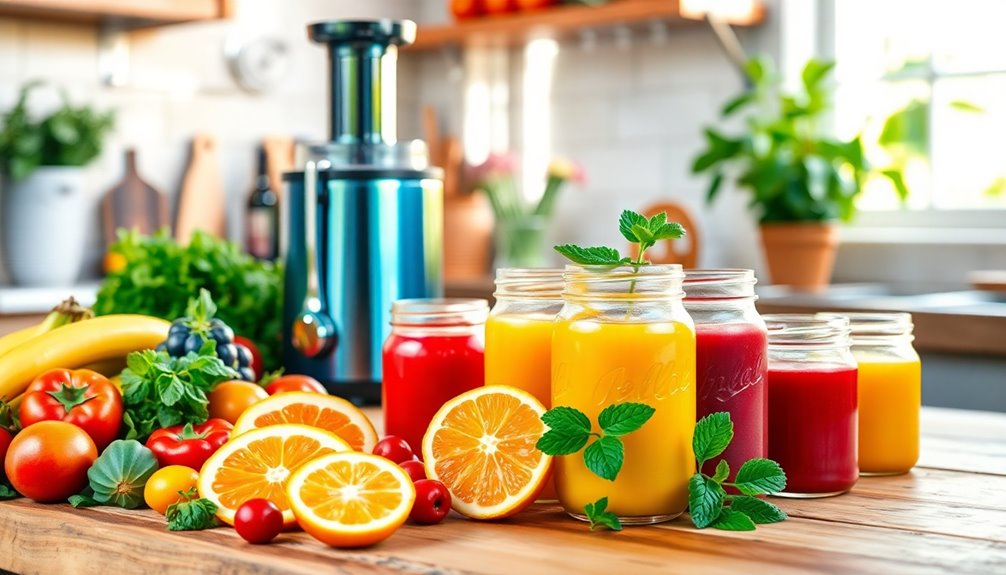
Starting your juicing journey can be an exciting way to boost your health and explore new flavors, especially if you understand a few key basics.
First, choose the right equipment; masticating juicers are great for beginners, while cold-press juicers excel with delicate ingredients. Consider your budget, available space, and how easy the juicer is to clean. Fresh juice boosts fruit and vegetable consumption, making it an ideal way to increase your daily nutrient intake. It's important to note that the juice yield from citrus fruits can vary significantly based on their ripeness and juicing method.
Next, select high-yield produce like cucumbers and berries for smooth juices and balance flavors with sweet fruits like apples and tart ones like lemons.
Set clear health goals and incorporate juicing into your daily routine for maximum benefits. Start with simple recipes, wash your ingredients well, and maintain a consistent schedule to enjoy all the delicious and nutritious possibilities juicing offers!
Frequently Asked Questions
Can I Use Frozen Fruits and Vegetables for Juicing?
Yes, you can use frozen fruits and vegetables for juicing, but you need to thaw them first.
Frozen produce can be hard, potentially damaging your juicer. Once thawed, it retains most of its nutrients and can yield nutritious juice.
Just remember to cut the thawed pieces into smaller chunks for easier juicing. You might want to add extra liquid or citrus to enhance the flavor, as frozen ingredients can sometimes lack vibrancy.
How Long Do Homemade Juices Last in the Fridge?
Homemade juices can last up to 72 hours in the fridge if you store them properly. However, they taste best within the first 24 hours.
The type of juicer you use matters too; masticating juicers usually extend shelf life compared to centrifugal ones.
To keep your juice fresh, use airtight glass containers and maintain a consistent refrigerator temperature between 35-40°F.
If you want longer storage, consider freezing your juice for up to 2-3 months.
Are There Any Juicing Devices I Should Avoid?
Imagine trying to juice a rubber tree—frustrating, right? That's how it feels when you pick the wrong juicer.
You should avoid centrifugal and high-speed juicers since they heat up and damage nutrients. Also, steer clear of old models and juicers with small chutes that waste your time.
Lastly, don't forget about safety features; a juicer's like a trusty sidekick, and you want it to keep you safe while you create delicious drinks.
Can I Juice Citrus Fruits With the Peel On?
You can juice citrus fruits with the peel on, but it's not always the best idea. The peels can add a bitter taste and may cause digestive issues due to indigestible oils.
If you're using organic fruits, you might consider it, especially for lemons and limes. However, it's usually better to remove the peels from oranges and grapefruits for a tastier, smoother juice.
Always wash your fruits thoroughly before juicing!
Is It Safe to Juice if I'm Pregnant?
Juicing while pregnant can be a double-edged sword—offering nutrient benefits yet posing safety risks.
It's crucial to ensure your juices are made from thoroughly washed, organic produce to minimize bacterial exposure. Avoid unpasteurized options and consume juices immediately to reduce contamination risks.
While juices can complement your diet, remember they shouldn't replace meals.
Always consult your healthcare provider to tailor dietary choices that best support your health and your baby's development.
Conclusion
In crafting your own homemade organic juices, you’re not just nourishing your body; you’re also embracing a healthier lifestyle. As the saying goes, “You are what you eat,” so why not fill your plate—and glass—with vibrant, nutrient-rich ingredients? By exploring various recipes and methods, you’ll discover flavors that excite your palate while benefiting the planet. So, grab your juicer and start this refreshing journey; it’s a delicious way to take control of your health! Experimenting with different combinations of fruits and vegetables can lead to delightful surprises, and you’ll soon find that organic juices for weight loss can be both tasty and satisfying. Incorporate ingredients like leafy greens, citrus fruits, and antioxidant-rich berries to create drinks that not only flavor your day but also help you reach your health goals. Embrace this journey and share your creations with friends and family; you might just inspire others to join you in this vibrant, healthful lifestyle!
Cindy thoroughly researches juicing trends, techniques, and recipes to provide readers with practical advice and inspiration. Her writing style is accessible, engaging, and designed to make complex concepts easy to understand. Cindy’s dedication to promoting the advantages of juicing shines through her work, empowering readers to make positive changes in their lives through the simple act of juicing.

